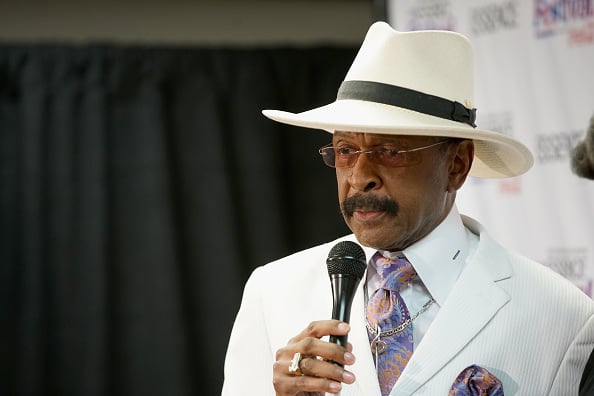What is Larry Graham's net worth?
Larry Graham is an American bass player who has a net worth of $3 million. Larry Graham Jr. stands as one of the most influential bassists in modern music history, revolutionizing funk and popular music through his innovative "slap bass" technique. As the original bassist for Sly and the Family Stone from 1966 to 1972, Graham helped define the funk sound of the late 1960s and early 1970s, contributing to hits like "Dance to the Music" and "Everyday People." After leaving Sly Stone's band, he founded Graham Central Station, which achieved significant success throughout the 1970s with their dynamic fusion of funk, soul, and R&B. Graham's distinctive playing style, which he developed while performing with his mother as a teenager, has influenced generations of bassists across multiple genres. His technical innovations and musical contributions have earned him recognition as the "Father of Slap Bass," and his influence extends from funk and R&B to modern hip-hop, where his recordings remain among the most sampled bass lines in history. In 1993, Larry was inducted into the Rock and Roll Hall of Fame as a member of Sly and the Family Stone.
Larry's half-brother, Dennis Graham, is the father of Aubrey Graham, the rapper better known as Drake. So Larry is Drake's uncle.
Early Life and Musical Beginnings
Born on August 14, 1946, in Beaumont, Texas, Larry Graham Jr. was immersed in music from an early age. His mother was a successful pianist, and young Larry began performing with her in local clubs when he was just a teenager. It was during these early performances that Graham developed his signature slap bass technique out of necessity – without a drummer in their duo, he needed to create both melody and rhythm with his bass. This innovative approach involved thumping the strings with his thumb and plucking them with his index finger, creating a percussive effect that would later become a foundational element of funk music.
The Sly and the Family Stone Years
Graham's joining Sly and the Family Stone in 1966 marked the beginning of his rise to prominence in the music industry. The band's groundbreaking fusion of funk, soul, rock, and psychedelia helped establish a new sound in popular music. Graham's bass playing was integral to the band's success, featuring prominently in classics like "Thank You (Falettinme Be Mice Elf Agin)" and "Family Affair." His time with the group coincided with their most successful period, including their legendary performance at Woodstock in 1969 and the release of their influential album "Stand!"
Graham Central Station and Solo Success
After departing Sly and the Family Stone in 1972, Graham formed his own band, Graham Central Station, which became a powerful force in funk music. The group's debut album in 1974 established them as worthy successors to the funk throne, with hits like "Can You Handle It" and "Your Love." Throughout the 1970s, Graham Central Station released a string of successful albums that showcased Graham's evolved bass technique and his talents as a bandleader, vocalist, and songwriter. The band's energetic live performances became legendary, featuring extended bass solos that demonstrated Graham's virtuosity.

Getty Images
Legacy and Influence
Larry Graham's impact on modern music cannot be overstated. His slap bass technique has become a standard part of bass playing across multiple genres, influencing musicians from Bootsy Collins and Les Claypool to Flea and Marcus Miller. Beyond his technical innovations, Graham's melodic and rhythmic approaches to bass playing helped establish the instrument as both a foundational and lead voice in popular music. His recordings continue to be sampled extensively in hip-hop and electronic music, ensuring his grooves remain relevant to new generations of musicians and listeners. In recognition of his contributions, Graham has been honored with numerous awards and is regularly cited as one of the most important bassists in popular music history.
Later Career and Continued Impact
In the decades following Graham Central Station's heyday, Graham has remained active in the music industry, collaborating with artists like Prince (who cited Graham as a major influence) and continuing to tour and record. He has also become a mentor to younger musicians, sharing his techniques and musical philosophy through workshops and performances. While his innovative playing style has become ubiquitous in modern music, Graham continues to be recognized as the originator of a technique that fundamentally changed the role of the bass guitar in popular music.
/2014/04/GettyImages-544503306.jpg)
/2018/09/Bruce-Foxton.jpg)
/2010/08/herbie-hancock-1.jpg)
/2016/09/GettyImages-683765732.jpg)
/2014/07/Chris-Jasper.jpg)
/2015/02/GettyImages-98537698.jpg)
/2020/07/mlp.jpg)
/2010/01/Deryck-Whibley.jpg)
/2020/07/jl.jpg)
/2010/01/GettyImages-183679600.jpg)
/2022/10/Anne-Murray.jpg)
/2014/09/Kim-Delaney.jpg)
/2009/11/Tim-Duncan.jpg)
/2023/01/lance-armstrong.jpg)
/2021/04/Sara-Gilbert.jpg)
/2025/03/Kelli-Ferrell.jpg)
/2010/05/Jaleel-White.jpg)
/2014/04/GettyImages-544503306.jpg)
/2015/02/GettyImages-98537698.jpg)
/2010/08/herbie-hancock-1.jpg)
/2014/07/Verdine-White.jpg)
/2014/09/Sam-Moore-1.jpg)
/2014/08/GettyImages-79685653.jpg)
/2014/08/GettyImages-826811750.jpg)
/2010/11/GettyImages-108009012-1.jpg)